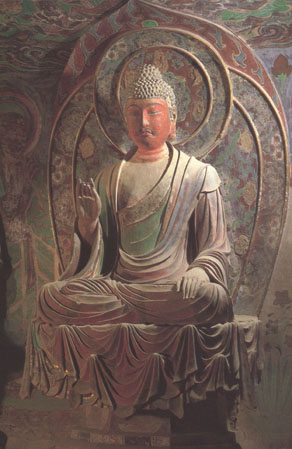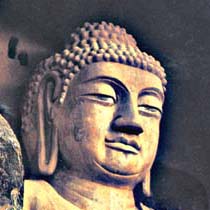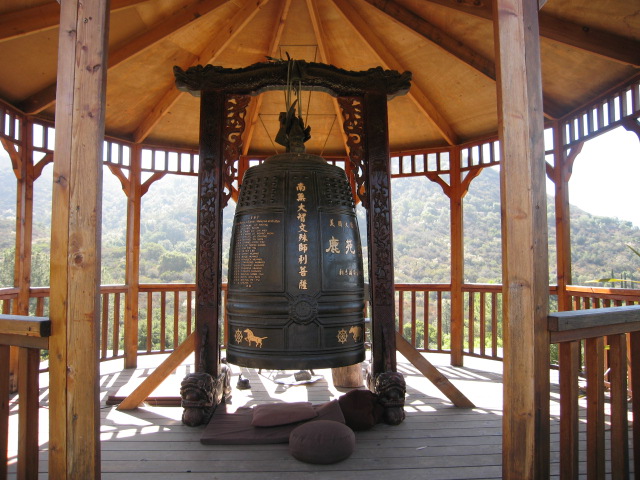 Thich Nhat Hanh
Thich Nhat Hanh > Quotes
Thich Nhat Hanh quotes (showing 51-100 of 122)
“Breathing in, there is only the present moment.
Breathing out, it is a wonderful moment.”
― Thich Nhat Hanh
“Walk as if you are kissing the Earth with your feet.”
― Thich Nhat Hanh, Peace Is Every Step: The Path of Mindfulness in Everyday Life
“If we are peaceful, if we are happy, we can smile and blossom like a flower, and everyone in our family, our entire society, will benefit from our peace.”
― Thich Nhat Hanh, Being Peace
“Attachment to views is the greatest impediment to the spiritual path.”
― Thich Nhat Hanh, Old Path White Clouds: Walking in the Footsteps of the Buddha
“I am determined to practice deep listening. I am determined to practice loving speech.”
― Thich Nhat Hanh, True Love: A Practice for Awakening the Heart
“If our love is only a will to possess, it is not love.”
― Thich Nhat Hanh, Peace Is Every Step: The Path of Mindfulness in Everyday Life
“Peace is present right here and now, in ourselves and in everything we do and see. Every breath we take, every step we take, can be filled with peace, joy, and serenity. The question is whether or not we are in touch with it. We need only to be awake, alive in the present moment.”
― Thich Nhat Hanh, Peace Is Every Step: The Path of Mindfulness in Everyday Life
“The kingdom of God is available to you in the here and the now. But the question is whether you are available to the kingdom. Our practice is to make ourselves ready for the kingdom so that it can manifest in the here and the now. You don't need to die in order to enter the kingdom of heaven. In fact, you have to be truly alive in order to do so.”
― Thich Nhat Hanh
“When we walk like (we are rushing), we print anxiety and sorrow on the earth. We have to walk in a way that we only print peace and serenity on the earth... Be aware of the contact between your feet and the earth. Walk as if you are kissing the earth with your feet.”
― Thich Nhat Hanh
“If in our daily life we can smile, if we can be peaceful and happy, not only we, but everyone will profit from it. This is the most basic kind of peace work.”
― Thich Nhat Hanh, Being Peace
“To dwell in the here and now does not mean you never think about the past or responsibly plan for the futurre. The idea is simply not to allow yourself to get lost in regrets about hte past or worriees about hte future. i fyou are firmly grounded in the present moment, the past can be an object of inquiry, the object of your mindfulness and concentration. you can attain many insights by looking into the past. But you are still grounded in the present moment.”
― Thich Nhat Hanh, The Art of Power
“In modern society most of us don't want to be in touch with ourselves; we want to be in touch with other things like religion, sports, politics, a book - we want to forget ourselves. Anytime we have leisure, we want to invite something else to enter us, opening ourselves to the television and telling the television to come and colonize us.”
― Thich Nhat Hanh, Being Peace
“If we are not fully ourselves, truly in the present moment, we miss everything.”
― Thich Nhat Hanh, Peace Is Every Step: The Path of Mindfulness in Everyday Life
“To think in terms of either pessimism or optimism oversimplifies the truth. The problem is to see reality as it is.”
― Thich Nhat Hanh, The Miracle of Mindfulness
“If you love someone but rarely make yourself available to him or her, that is not true love.”
― Thich Nhat Hanh, Living Buddha, Living Christ
“The fact is that when you make the other suffer, he will try to find relief by making you suffer more. The result is an escalation of suffering on both sides.”
― Thich Nhat Hanh, Anger
“Because of your smile, you make life more beautiful.”
― Thich Nhat Hanh
“Do not avoid contact with suffering or close your eyes before suffering. Do not lose awareness of the existence of suffering in the life of the world. Find ways to be with those who are suffering by all means, including personal contact and visits, images, sounds. By such means, ...awaken yourself and others to the reality of suffering in the world. If we get in touch with the suffering of the world, and are moved by that suffering, we may come forward to help the people who are suffering.”
― Thich Nhat Hanh
“I would not look upon anger as something foreign to me that I have to fight... I have to deal with my anger with care, with love, with tenderness, with nonviolence.”
― Thich Nhat Hanh, Being Peace
“I am inviting you to go deeper, to learn and to practice so that you become someone who has a great capacity for being solid, calm, and without fear, because our society needs people like you who have these qualities, and your children, our children, need people like you, in order to go on, in order to become solid, and calm, and without fear.”
― Thich Nhat Hanh
“You are not an observer, you are a participant.”
― Thich Nhat Hanh, Being Peace
“From time to time, to remind ourselves to relax and be peaceful, we may wish to set aside some time for a retreat, a day of mindfulness, when we can walk slowly, smile, drink tea with a friend, enjoy being together as if we are the happiest people on Earth.”
― Thich Nhat Hanh, Being Peace
“In mindfulness one is not only restful and happy, but alert and awake. Meditation is not evasion; it is a serene encounter with reality.”
― Thich Nhat Hanh, The Miracle of Mindfulness
“If you love someone, the greatest gift you can give them is your presence”
― Thich Nhat Hanh
“There is no enlightenment outside of daily life.”
― Thich Nhat Hanh
“The most precious gift we can offer anyone is our attention. When mindfulness embraces those we love, they will bloom like flowers.”
― Thich Nhat Hanh
“Those who are without compassion cannot see what is seen with the eyes of compassion.”
― Thich Nhat Hanh, The Miracle of Mindfulness
“A human being is like a television set with millions of channels.... We cannot let just one channel dominate us. We have the seed of everything in us, and we have to recover our own sovereignty.”
― Thich Nhat Hanh
“Being rich is an obstacle to loving. When you are rich, you want to continue to be rich, and so you end up devoting all your time, all your energy, in your daily life to stay rich.”
― Thich Nhat Hanh, True Love: A Practice for Awakening the Heart
“Do not say that I'll depart tomorrow because even today I still arrive.”
― Thich Nhat Hanh, Being Peace
“An oak tree is an oak tree. That is all it has to do. If an oak tree is less than an oak tree, then we are all in trouble.”
― Thich Nhat Hanh, Being Peace
“Life can be found only in the present moment. The past is gone, the future is not yet here, and if we do not go back to ourselves in the present moment, we cannot be in touch with life.”
― Thich Nhat Hanh
“Smile, breathe and go slowly." - Thich Nhat Hanh, Vietnamese Zen monk, author and peace activist. ”
― Thich Nhat Hanh
“Earth will be safe when we feel in us enough safety.”
― Thich Nhat Hanh, Call Me By My True Names
“The miracle is not to walk on water. The miracle is to walk on the green earth, dwelling deeply in the present moment and feeling truly alive.”
― Thich Nhat Hanh
“if your love is only a will to possess, its not love”
― Thich Nhat Hanh
“In true dialogue, both sides are willing to change.”
― Thich Nhat Hanh
“There is a story I would like to tell you about a woman who practices the invocation of the Buddha Amitabha's name. She is very tough, and she practices the invocation three times daily, using a wooden drum and a bell, reciting, "Namo Amitabha Buddha" for one hour each time. When she arrives at one thousand times, she invites the bell to sound. (In Vietnamese, we don't say "strike" or "hit" a bell.) Although she has been doing this for ten years, her personality has not changed. She is still quite mean, shouting at people all the time.
A friend wanted to teach her a lesson, so one afternoon when she had just lit the incense, invited the bell to sound three times, and was beginning to recite "Namo Amitabha Buddha," he came to her door, and said, "Mrs. Nguyen, Mrs. Nguyen!" She found it very annoying because this was her time of practice, but he just stood at the front gate shouting her name. She said to herself, "I have to struggle against my anger, so I will ignore that," and she went on, "Namo Amitabha Buddha, Namo Amitabha Buddha."
The gentleman continued to shout her name, and her anger became more and more oppressive. She struggled against it, wondering, "Should I stop my recitation and go and give him a piece of my mind?" But she continued chanting, and she struggled very hard. Fire mounted in her, but she still tried to chant "Namo Amitabha Buddha." The gentleman knew it, and he continued to shout, "Mrs. Nguyen! Mrs. Nguyen!"
She could not bear it any longer. She threw away the bell and the drum. She slammed the door, went out to the gate and said, "Why, why do you behave like that? Why do you call my name hundreds of times like that?" The gentleman smiled at her and said, "I just called your name for ten minutes, and you are so angry. You have been calling the Buddha's name for ten years. Think how angry he must be!”
― Thich Nhat Hanh, Being Peace
“Letting go gives us freedom, and freedom is the only condition for happiness. If, in our heart, we still cling to anything - anger, anxiety, or possessions - we cannot be free.”
― Thich Nhat Hanh, The Heart of the Buddha's Teaching
“The problem is whether we are determined to go in the direction of compassion or not. If we are, then can we reduce the suffering to a minimum? If I lose my direction, I have to look for the North Star, and I go to the north. That does not mean I expect to arrive at the North Star. I just want to go in that direction.”
― Thich Nhat Hanh, Being Peace
“I clean this teapot with the kind of attention I would have were I giving the baby Buddha or Jesus a bath.”
― Thich Nhat Hanh, The Miracle of Mindfulness
“Anyone can practice some nonviolence, even soldiers. Some army generals, for example, conduct their operations in ways that avoid killing innocent people; this is a kind of nonviolence. To help soldiers move in the nonviolent direction, we have to be in touch with them. If we divide reality into two camps - the violent and the nonviolent - and stand in one camp while attacking the other, the world will never have peace. We will always blame and condemn those we feel are responsible for wars and social injustice, without recognizing the degree of violence in ourselves. We must work on ourselves and also with those we condemn if we want to have a real impact.
It never helps to draw a line and dismiss some people as enemies, even those who act violently. We have to approach them with love in our hearts and do our best to help them move in a direction of nonviolence. If we work for peace out of anger, we will never succeed. Peace is not an end. It can never come about through non-peaceful means.”
― Thich Nhat Hanh, Love in Action: Writings on Nonviolent Social Change
“At any moment, you have a choice, that either leads you closer to your spirit or further away from it.”
― Thich Nhat Hanh
“You have to learn how to help a wounded child while still practicing mindful breathing. You should not allow yourself to get lost in action. Action should be meditation at the same time.”
― Thich Nhat Hanh
“We who have touched war have a duty to bring the truth about war to those who have not had a direct experience of it. We are the light at the tip of the candle. It is really hot, but it has the power of shining and illuminating. If we practice mindfulness, we will know how to look deeply into the nature of war and, with our insight, wake people up so that together we can avoid repeating the same horrors again and again.”
― Thich Nhat Hanh, Love in Action: Writings on Nonviolent Social Change
“May our heart's garden of awakening bloom with hundreds of flowers.”
― Thich Nhat Hanh
“Nonviolent action, born of the awareness of suffering and nurtured by love, is the most effective way to confront adversity.”
― Thich Nhat Hanh, Love in Action: Writings on Nonviolent Social Change
“You must love in such a way that the person you love feels free.”
― Thich Nhat Hanh
“Know that life can only be found in the present moment.”
― Thich Nhat Hanh, Peace Is Every Step: The Path of Mindfulness in Everyday Life
“Anyone can practice some nonviolence, even soldiers. Some army generals, for example, conduct their operations in ways that avoid killing innocent people; this is a kind of nonviolence.”
― Thich Nhat Hanh, Love in Action: Writings on Nonviolent Social Change

































